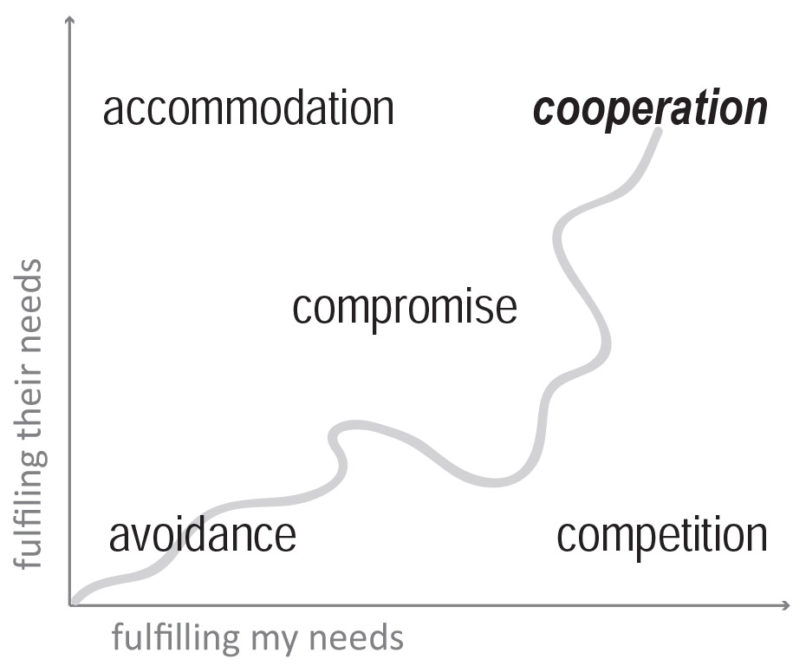Understanding and Analysing Conflict
The main objectives of the Understanding and Analysing Conflict workshop include making a clear distinction between conflict and violence, analysing your own behaviour and that of others in conflict situations, helping to develop an understanding of conflict as an opportunity for change and, by extension, empowering participants to constructively deal with conflicts. Additional objectives include a better understanding of the emotions that accompany conflicts, understanding the factors that influence conflict transformation, analysing the causes of conflict, encouraging personal change, etc.
Workshop Example
Game
Life on an Island
Type of exercise: Role play
Duration: 70–90 minutes
Materials: Flipchart paper, markers
Exercise description
The participants split into small groups (of 5 to 7 people). They are told that they find themselves on a desert island – each small group on its own island – and that there is no way to leave. To organise life on the island, they have to agree on and establish a common system of rules. They have 10 minutes to agree on their rules, and then they present them in the plenary.
In the next step, get one volunteer from each group. Volunteers are taken out of the room and told that they will be going back to a different “island”. Their task is to defy the rules agreed on by the group on their new island and to try to change the rules or to boycott them.
After 10 minutes of the volunteers being on their new islands, the exercise is stopped and followed by evaluation.
Evaluation
Suggested questions to evaluate the exercise:
Ask each group: What happened? Then tell them about the instructions given to the new islanders.
How did the newcomers feel about their role as rule-breakers, and how did the islanders feel about their system being disrespected?
Who was the victim and who was the aggressor? How does this experience relate to real life?
Note
If some of the participants are familiar with this exercise from before, you can ask them to be observers and contribute valuable insights to the evaluation.
Conflict Barometer
Duration: 30 minutes
Exercise description
The barometer method
Suggested statements for the barometer:
- Every conflict is bad.
- Conflict is the same as violence.
- You should show your emotions in a conflict.
- The victim also bears responsibility for the conflict.
- I am responsible for the conflicts in my society.
- If there are opposing interests, the conflict cannot be resolved.
- Power determines how the conflict will be resolved.
Wall Newspaper: Conflicts Arise Because of…
Trajanje: 5–10 min.
Zidne novine: Vrste ponašanja u sukobu
Duration: 5–10 minutes
Wall Newspaper: Types of Behaviour in Conflicts
Type of exercise:
Duration: 5–10 minutes

Discussion of Behaviours in Conflict Situations in Small Groups
Type of exercise: Work in small groups
Duration: 25–30 minutes
Exercise description
Split into small groups (of four, for example). Discussion topics:
- What do I find hardest in conflicts?
- What dilemmas do I have?
- In which situations do I find myself at a loss about how to respond?
- What can help?
Alternative version of the exercise
Discussion topics:
– Behaviours in communication with others (among the group, during the training) that I liked.
– Behaviours that I perceived as creating fertile ground for conflict.
– Behaviours that do not contribute to conflict transformation.
Or:
Everyone remembers a conflict that has been transformed or that is still ongoing and writes down:
– a description of the conflict,
– their own behaviours in the conflict,
– their own feelings in relation to the conflict.
Then they discuss in small groups, without feedback in the plenary.
Note
This alternative version of the exercise is especially useful if there are animosities in the group or simmering conflicts, as a space for reflection and to encourage communication about such difficulties.
